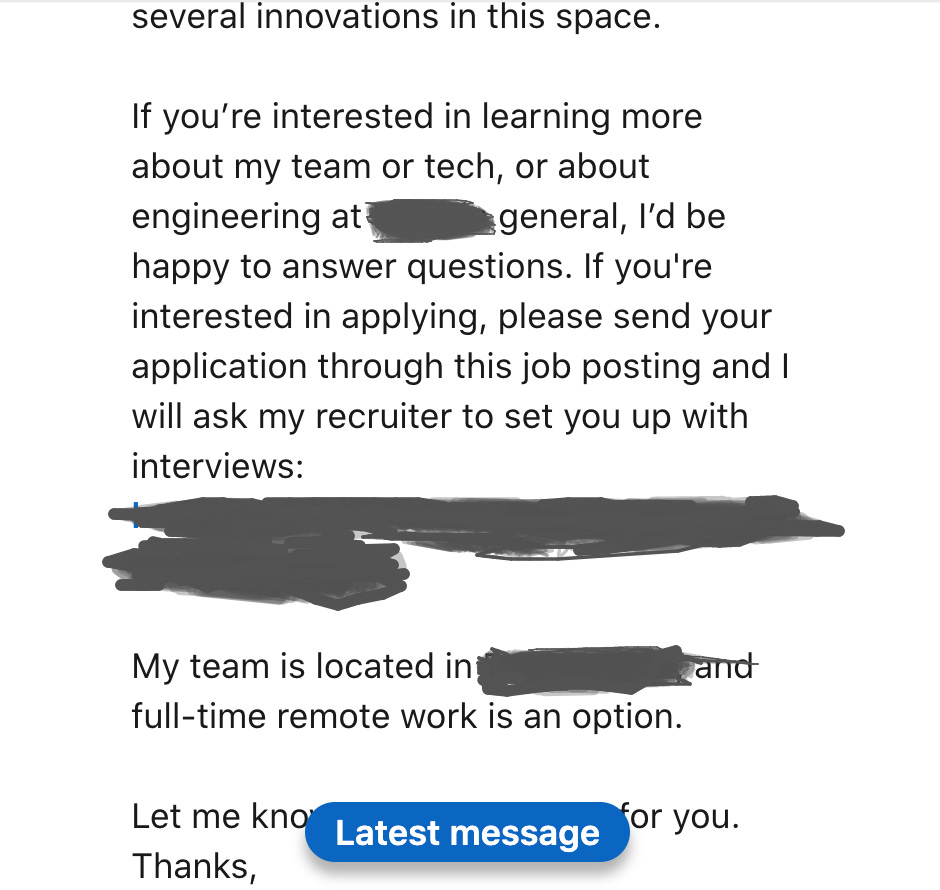Contacting hiring managers shouldn't be scary
You're helping them do their job. Suggestions for reaching out, and how to make yourself more approachable if you are a hiring manager.
Note: I’m hiring! Come join my team! I’m looking for a Senior Full-Stack Java Engineer, fully remote (US-based), to join a dynamic team in a growing company working on the most valuable repository of veterinary data in the country. Feel free to contact me on LinkedIn, email, or Twitter with any questions that might help you determine whether it could be a good fit for you or anyone you know.
The status quo of posting open roles on social media
When hiring managers want more applicants, they often post their roles on LinkedIn and other social media sites.
The posts often go something like this:
“I’m hiring for X role. Here are some details about the team and/or tech. If you’re interested, apply at this job link: ___.”
Or if the hiring manager is feeling generous, they might add:
“Feel free to contact me with any questions” or “Reach out with any questions”
First off, it’s great that these hiring managers to be taking an active role in sourcing candidates and sharing the news about their open roles. They’re already miles ahead of many hiring managers, and it reflects well on them that they are taking these steps to improve candidate quality — both for their own own performance as managers and the overall health and quality of their teams.
The only problem is …. these posts and messages can be really intimidating to candidates. Almost as bad as that haunted-looking house.
Let’s think about this from a candidate’s perspective:
“Let me know if you have any questions” can come across as “Try to impress me”
In an interview, “do you have any questions” is typically to give candidates who are very close to an offer to impress the interviewer with their intelligent questions showing their perceptive takes on the business. If they’ve made it to the final interview stage, then hopefully they’ve taken the time to prepare some good questions.
However, when asking “let me know if you have any questions” at the start of an interview process might just mean “Let me know if I can address any concerns before you apply.”
As a candidate, you don’t necessarily know which meaning is intended. Do they want impress-me type questions, team fit-based questions, or just simple questions that you need to get answered before you apply?
Questions can mean so many different things in the context of tech hiring and interviews. Potential candidates can be left trying to solve a very difficult puzzle (what do they mean by “questions?”) in order to just get to the step of contacting the hiring manager.
Maybe I’m wrong about this and the questions to ask a hiring manager should be obvious, but this vagueness has tripped me up before (story coming up below).
Being asked to apply with no other interaction isn’t always that compelling
It’s fairly common to see posts that describe a role or even hype it up a bit, then just encourage people to apply on the jobs site.
You might think it’s efficient to just ask candidates to apply on the jobs, if they need to do that in order to be considered for the interview process, but you might also lose out on some candidates who don’t yet feel invested enough in the role or you as a manager to complete the job application.
Candidates know they might just get a canned rejection after submitting a resume. if they haven’t interacted with the hiring manager yet (aside from reading the post encouraging them to apply), they have no idea whether the hiring manager is going to be interested in them.
Job-seekers are busy people, too. The job-seeker might ask themselves whether it’s worth taking the time to read the job description in detail, tailor their resume, or maybe even write cover letters, when they don’t have much faith that anything will come of it.
A simple, small exchange with the hiring manager (demonstrating interest from the manager) or the ability to clear up a question about the role with them might push the job seeker over the threshold and make it feel worthwhile to actually apply.
It might not sound that hard, but submitting an application online can require a significant investment of time from a candidate. You might want to try applying for your own roles and see what’s involved.
Offering job seekers some other opportunity for contact with you before they apply might help them get over the hump to apply.
In general, it can be daunting for candidates to contact hiring managers
Even when hiring managers go out of their way to message you or post that they are happy to answer questions, lots of people — myself included — can be intimidated by hiring managers.
It’s part of a broader problem where people don’t always internalize how much managers need them and want them to be happy.
In the case of open roles, hiring managers need talent for their teams. They need top players who can do the jobs, integrate into the existing teams well, and make them look good — and they often need these people fast.
Sure, hiring managers have some power to accept or reject candidates, but candidates also have power over the managers. They could choose not to apply and might leave the manager with a pool of lesser-quality candidates. The evaluation goes both ways.
It’s hard to find good candidates who are also interested in the role
It’s not that easy to find people who have the skills, drive, and character needed to excel in a role who are also are likely to be interested in the role (since they don’t have much better options) and content with the compensation your company can offer for it.
If you’re one of these people, at least in the early stages of the interview process, you are extremely valuable to the hiring manager. They might be very eager for you to message them or apply and to increase their options for filling their role.
Undoubtedly, not all hiring managers feel this way, but if the hiring manager is going through the trouble to post about their role or even contact potential candidates about it, chances are that hiring manager would be happy to hear from you, if you’re potentially a fit.
My sad story of feeling intimidated by a message from a hiring manager
I was once contacted on LinkedIn by a hiring manager who was looking to fill what was then my dream role at a dream company.
Unfortunately, I put off responding, thinking I needed to research his team and read the company tech blog first to think of some really impressive questions. I started working on questions but didn’t feel confident about them. Not surprisingly, I didn’t end up asking any questions at all.
In this case, the hiring manager had gone out of his way to locate me in the sea of LinkedIn and used a LinkedIn InMail credit to send me a message, hoping I might give him another option by applying to his role. Looking back at the message as a manager, I can sense his urgency for applicants. However, I unfortunately chickened out and didn’t follow up.
I see his reach-out differently now. If I could do it over again, I’d ask anything I needed to know in order to apply (following his instructions) and then just apply and let him know I applied, to see if I might be able to help with the personnel shortage on his team.
That bring us to:
How can hiring managers reduce the barriers for applicants contacting them or applying?
If candidates are often intimidated by hiring managers, how can hiring managers reduce the barriers to these candidates contacting them about open roles?
How can they make the path for contacting them a little more welcoming?
Give potential candidates very specific instructions for how to contact you
Understand that contacting a hiring manager at all can be scary for most people —myself included.
When you don’t specify how to contact you regarding an open role, potential candidates can be left with the additional concern of wondering if the way they want to contact you or the topics they want to ask about will be appropriate.
It feels like a test: “Let me know if you have any questions.” A question could mean lots of different things, ranging from a simple yes/no query about candidate eligibility to a well-crafted rhetorical inquiry drawn from hours of research on the technical blog.
It’s like a vague system design prompt — except the job seekers don’t even have the benefit of an interviewer to help them hash out the requirements.
(That’s a funny image. Could you imagine trying to gather requirements from a hiring manager for what they mean by “any questions” before asking your questions?)
Have some empathy for potential candidates. They’re trying to make a good impression on someone generally at a higher level of the org and potentially at a better company than they’ve worked at before. The hiring manager might reject them or not even respond at all. When you add these differentials in power, vagueness can become even more paralyzing.
However, if the hiring manager give specific instructions for contacting them or next steps, this can reduce job seekers’ stress, and they can even reference the hiring manager’s instructions when they do reach out (e.g., “You asked me to send my resume, so I’m attaching it here….”).
Here are some ideas for specific instructions to give potential applicants:
“Please send your resume to me at ___.”
“Feel free to grab some time on my Calendly to talk about __(suggested topics)__.”
“I’d be happy to answer any questions you might have, such as about the work-life balance, the existing team makeup, or what you would work on in the role” (gives some suggestions for acceptable questions)
Then, the potential applicants can feel confident just following the hiring manager’s instructions. If the hiring manager said to do it, it must be ok!
Moreover, try not to ask candidates to do a lot of work in order to contact you. Ideally they’d be able to follow your instructions without a lot of background research. Maybe don’t suggest for them to ask questions about your tech that would take a lot of research to prepare. Or if you do offer to answer questions about the tech, make it clear that the purpose is just to help the candidate get excited about the work.
It’s important for accessibility to be careful that you don’t on’t weed out good candidates who are simply too busy to do a lot of unpaid work on a role they aren’t even sure will go anywhere at this early stage.
If you chat with prospective candidates, focus on them and their needs
Some engaged hiring managers offer to chat with potential candidates before they apply.
How you handle these chats can have a big impact on how the candidate feels about joining your team and how comfortable they are getting their questions answered.
Don’t just show up and have nothing to say like a blank slate. Don’t grill them, either.
Instead, have some questions prepared (if they don’t already fill the time with their own questions) to find out more about them and their needs.
Think of it as a first one-on-one. The format might not be exactly the same, but the overall purpose of the call is similar — to be there for your team member or potential team member.
Try to learn about them and what they need. If you throw in a little about your team and mission, that’s cool — but mostly focus on them.
Demonstrate to them that if they join your team, their needs will be a priority. This is something that candidates will notice.
Have an online presence as a hiring manager
Some candidates might not feel ready to just follow your instructions and reach out to you. They might want to get a sense for what you’re like first.
This is where having an online presence can help candidate to feel more comfortable contacting you.
Blogging is almost always a good idea for anyone who works in tech. Among other benefits to your network, learning, and sharing with the community, blogging puts a sample of your personality online so that people can get a taste for who you are before taking the next step and contacting you or booking time with you.
Sharing a little about your interests can help, too. Maybe it will even give potential applicants something to mention as a shared interest — e.g., “I saw you’re a football/hiking/hockey fan/Texas alum….”
This one depends on personal taste and your level in the organization, but I’ve found it’s the case that when other people share a little about themselves, I’m much more comfortable getting in touch with them.
I was reading a blog (Michael’s Newsletter), and initially, I was very intimidated by how the author was putting out all these impressive posts on how to succeed in tech. But then one day, he posted a post about his time at a relationship workshop and went into some aspects of his personal life: I Attended a $4,000 Relationship Workshop. It Was Worth Every Cent. This made him so much more approachable. I ended up messaging him, commenting a little, and sharing some ways his blog had helped me. I don’t think I would have contacted him if he hadn’t made himself seem like someone I could relate to. Increasing his vulnerability a little bit — within the range of what worked for his platform and audience — made him more approachable.
How much you should share might depend on your role and company, and it’s definitely possible to overdo this, but given that there’s a movement in tech toward bringing your whole self to work, taking small steps in that direction might signal to candidates that you cultivate that kind of environment on your team.
Treat your potential team members the way you treat your team members
Candidates might worry too much about how they come across in these initial contacts with hiring manager — but hiring managers might not worry enough!
Potential candidates are also evaluating you! The way you treat people who might join your team says a lot about what kind of manager you might be if they did join your team.
The personal qualities of a manager and their commitment to their team members’ success are an extremely important component of a role. Most candidates — and certainly most A-players — are evaluating this when looking for their next roles.
It’s been said that having a good manager in a bad company can be better than having a bad manager in a good company.
Manager quality isn’t something candidates can easily tell from a job description. Some hiring managers write their own job descriptions but, depending on the company, other people and departments might restrict or contribute to these. A humdrum job description isn’t always a reflection on the particular manager.
Furthermore, job descriptions rarely describe or even name the manager. It’s the rare company that describes what their managers — let alone this particular manager — offer to team members.
This all results in one of the most important factors for evaluating a role — the manager — often being a mystery until much later in the job interview process.
You can fix that as a manager by making yourself accessible to potential candidates before they begin the interview process and demonstrating your managerial values as you do this.
If one of your values as a manager is helping your team with their career goals, you could encourage potential candidates to share their career goals. If you try to make work enjoyable and low-stress, you could welcome questions about work-life balance and team culture.
It’s hard to give specific advice for how to do this, because it really depends on your company, your style as a manager, and even the existing team and what they value (they are stakeholders in this, too).
However, there are plenty of points where you can demonstrate your values to potential team members: by respecting their needs to know it’s worth their time to apply, by learning about them if they have a call, or by making the process of contacting you and applying as seamless as possible.
Make sure that at every point of interaction with potential future team members, you are demonstrating your values as a manger. These people are part of your broader team — almost like backups in a sports team.
You might only be able to hire one or a few, but your success as a manager relies on this pool of potential applicants, just as it depends on the people who actually work on your team. Treat potential team members with the respect they deserve for being in this important position.
Let’s switch over to what this implies for job candidates.
Don’t be afraid to contact hiring managers
If someone is hiring, it’s because they have a need on their team. The need might be really great — like a gap in the team that is putting stress on existing members or threatening productivity and causing problems with other relationships in the company.
Hiring is also a lot of work for a manager, particularly when they likely already have this need on their team.
If a hiring manager asks people to reach out to them, and you reach out (while following their instruction), you are helping them to do their job. You are making their life easier.
Even when they haven’t explicitly asked you to reach out, there can still be tactful, respectful ways to reach out and let them know you might be able to help with the problem they have of this role not being filled yet.
In this case, you might do a quick pitch for yourself, but keep the focus mostly on their needs.
Definitely try to put your best foot forward and make sure you seem professional when reaching out, but you don’t need to be intimidated by the hiring manager. You’re both just professionals specializing in different roles trying to see if you might want to enter into a partnership.
If the hiring manager invites you to contact them, do this
If the hiring manager offers to answer questions or have a quick chat with you, take them up on this. This doesn’t only help you; it also helps them to get a better idea of who you are. Resumes can only convey so much, and a hiring manager can learn more about you through having a small interaction.
You don’t need to stress too much about this or over-prepare, but try to be professional and make a good impression.
Letting them learn a little about you and your communication style (written or in-person) might help to bring you to the top of their metaphorical pile of resumes. It can give you an edge over people who simply applied but didn’t take the hiring manager up on the opportunity to connect before the interview process.
In general, hiring managers (and recruiters) are busy. If they list themselves as the contact person for a job or if they post about the job, they would probably enjoy hearing from you that you’ve applied, you meet their requirements, and you’re interested in the role.
It’s hard digging this information out of resumes and applications. You don’t really know how invested the person is in the role if they just applied. Resumes don’t show much about a person’s communication style, and lots of good candidates have bad resumes.
You can fill in a lot of these gaps by pinging the hiring manager or recruiter or whomever is connected with the job to say you’ve applied and you’re interested, with a short pitch for yourself.
Look up the hiring manager online
Some people don’t share much, but maybe you’ll get a feel for their personality and how they work as a manager from their LinkedIn activity history, any other social media, any writing they do or any talks they’ve given.
Learning more about them can help to guide you in the tone to take when contacting them or chatting with them.
It can also help you to gauge how interested you are in working for them. Part of the reason that engineering leaders give talks and blog in the first place is to put their employer brand and their personal brand online to attract A-players. Take them up on what they’ve put out there and use it to learn if this is someone you could pass on or someone you’d be really excited to work for.
Don’t forget to apply and let the hiring manager know you’ve applied
This might be obvious, but in many companies with HR or compliance issues, candidates must submit an official application in order to be considered.
It can be very helpful to the hiring manager if you apply and also let the hiring manager know you’ve applied, particularly if they already went out of their way to contact you or answer your questions.
This way they know that you’re officially in the system as an option for filling their open position. They might even ask the recruiter to give your resume a second look, if the recruiter doesn’t think you’re a fit but they did think you were a fit.
Applying and letting the hiring manager know you applied can be music to their ears.
Build relationships and use your network
One of the best ways to have less stress about reaching out to a hiring manager or is to have friends or connections in common, a referral from an existing team member, or better yet, to have worked with them before.
Go ahead and have one-on-one chats with your coworkers, do informational interviews, have chats with managers who reach out to you, contact people who inspire you or whose work you appreciate, and try to network even when you aren’t sure of the immediate value. You never know where connections could lead in the future. Even taking some interviews here and there can help you to branch out and get to know people in the larger tech scene.
When you’re looking for a new role, ask your network. A job search isn’t just about finding the right role and company — it’s also about finding the right manager relationship. Your network might help you to identify opportunities to work for great people.
Conclusion
This post has been a real melange of advice and thoughts for many different audiences and situations, but I hope it’s inspired some thoughts about how to make hiring more humane and accessible.
I’m new to hiring, and I might be wrong about some of this, but the bulk of my suggestions come from experiences I had on the candidate side. Gergely Orosz at The Pragmatic Engineer said something that stuck with me — that one of the best ways to learn to manage is to think about things you didn’t like that mangers have done to you and to try not to do those things.
On that note, is there anything you try not to do after seeing it go poorly when you or a different hiring manager did it?
Conversely, is there anything you do or recommend to do to facilitate smooth connections between hiring managers and their potential new team members?
Let me know in the comments below, or feel free to email me or message me on LinkedIn with your thoughts (feel free to send an invite if you don’t have InMail credits). Would love to hear from you.
If you’ve enjoyed this post, please share it with someone who might like it, your network, or a group, and please like and subscribe!
Update (May 2, 2023):
Also, feel free to apply for my role (and let me know you’ve applied!) or to share with anyone you know who might be interested in a remote senior software engineer role: https://www.linkedin.com/jobs/view/3588974115/
It’s been said many times, notably by John Vlastelica, that engaged hiring managers get better talent. Top talent and A players want to work with hiring managers who .















